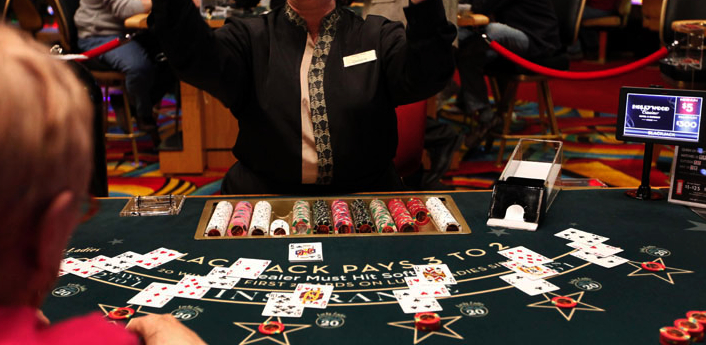AUGUSTA — Like many parents, Mike Mullett has tried to raise money for his children’s sports teams with raffles, candy sales, and bottle drives.
He’s volunteered to raise money for soccer, basketball, and football. But he quickly grew tired of fundraisers that kept hitting up the same people in the community over and over for more and more money. Parents often sold items for their children at the office, or just bought whatever their child was selling to keep them from having to go door to door.
That all changed in 2009 with a poker tournament that raised more than $1,000 for the youth basketball team, drew more than 70 players and, according to Mullett, “didn’t require kids to sell anything or parents to buy anything.”
Since that time, they’ve held 18 state-licensed events, raised more than $12,000 and now have a list of 300 poker players who want to be notified each time they hold a tournament.
Mullett, of Westbrook, told legislators on the Veterans and Legal Affairs Committee Wednesday that he’d like to help the dozens of other nonprofit groups who have asked him to help them raise money. But state law prohibits someone who’s not already a member of a nonprofit from conducting tournament games.
So Mullett contacted Rep. Corey Wilson, R-Augusta, and asked him to sponsor L.D. 121, which would allow charitable organizations to hire non-members to conduct tournament games and for that person to be paid up to 20 percent of the gross revenue collected from entry fees.
“Poker is a game that is really popular,” Mullett said. “Television coverage of (poker tournaments) has created a lot of players.”
Legislators on the committee asked several questions of Mullett, saying they feared that “mobile casinos” would pop up across the state.
“If six or eight groups wanted to participate together, they could run a game five days a week to open a mini-casino on behalf of nonprofits,” said Rep. Tom Longstaff, D-Waterville.
Mullett said it would be his intention to help each nonprofit one time, and then they would be on their own after that. Each event must be licensed by Maine State Police, and State Police Lt. Scott Ireland told the committee that while the department does not oppose the bill, he would want the law to continue to hold the nonprofits responsible for running the events.
“One area of concern with this bill would be that the organizations may try to shift responsibility for the operation of the game to the hired nonmembers,” Ireland said.
Those responsibilities include a record of all financial transactions that detail gross revenue, expenses, prizes, printing, licenses, and the disposition of all proceeds.
Rep. David Johnson, R-Eddington, said he did not understand why someone affiliated with a nonprofit would want to get paid.
“It dumbfounds me that people would want to charge to help a nonprofit,” he said.
Mullett said the fee would help pay for the software, chips and other equipment that his groups have had to buy over the years to run the games. He said it’s important to run a professional game because dealers sometimes make mistakes and tensions can run high if things don’t go as planned.
“It’s a rare group that has somebody involved who knows how to run the game,” he said. “If this bill was law in 2009, we could have helped other groups make money.”
The committee is scheduled to hold a work session on the bill at 1 p.m. Feb. 20.
Susan Cover — 621-5643
scover@mainetoday.com
Send questions/comments to the editors.



Comments are no longer available on this story